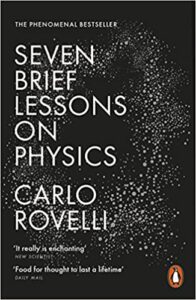Continuing on the recent theme of books about the cosmos/astronomy/physics, I read Seven Brief Lessons on Physics by Carlo Rovelli while having a long soak in the bath – for reasons that I’m about to explain, the bath didn’t take as long as you may think, and I certainly did not look prune-like by the end of!
My initial impressions of Seven Brief Lessons on Physics were not favourable. Firstly, the book is very short – a skinny, seventy-nine pages of large print. If it were fiction, it would be described as a short story/novella. Since I was expecting something which was going to be hard science, I didn’t get “into it” immediately. Initially it struck me that the target audience was those who are not of a scientific bent; more arty and those that would opt to read the literary, rather than the technology, supplement of their Sunday newspaper. But, once I’d switched mindset, the cadence of the Seven Brief Lessons on Physics really started to sing to me.
Key points were the non-linear view of time, and also how “now” doesn’t really exist, and that concepts of time can be very localised. For instance, how “now” and localised time on Earth versus their equivalents on Jupiter or Alpha Centuri (four hours and four light years away respectively) can all be very different indeed. It is how time is perceived by the individual.
Furthermore, there is the notion that time is akin to entropy, where apparently chaotic like states are seen to be ordered (past & present), but only based on the order projected upon the subject of the entropic state of time by the viewer. Analogous to bolts ordered/separated by their colour vs the colour blind person who sees chaos since they perceive order based on bolt size!
In addition, how loop quantum gravity might be able to tie general relativity, quantum mechanics and thermodynamics together. Furthermore, that the Rosetta stone of these dislocated theories might be black holes. This is because an infinite state is not logical and also that thermodynamics dictates that a changed state in entropy must omit energy, thus Hawking radiation must be present.
Once you’ve read the book, a very good piece of follow-up material is a Royal Institute lecture by the man himself, Carlo Rovelli, which focuses in on the subject of time itself.

